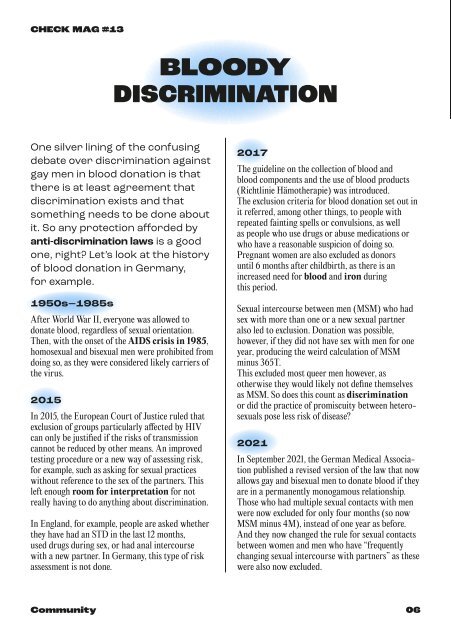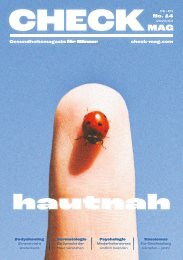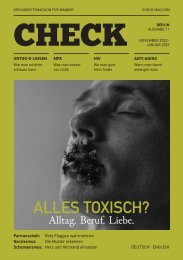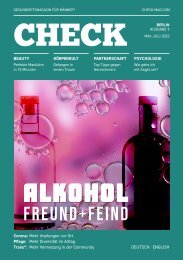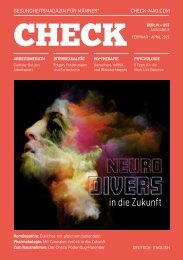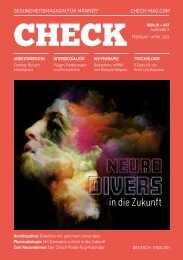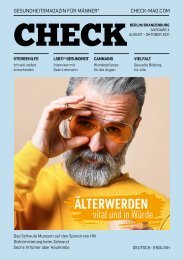CHECK Magazin - Gesundheitsmagazin für Männer No.13
Menschen bestehen aus Fleisch und Blut und natürlich aus zahlreichen anderen Dingen. Obwohl wir aber so viele Gemeinsamkeiten haben, ist es bisher nicht gelungen, die sozialen, finanziellen und kulturellen Unterschiede zu überwinden. Im Gegenteil, wir leben zwar in einer Zeit, in der die Kunst der strategischen Problemlösung kultiviert wird, driften aber immer weiter auseinander. Daher schauen wir in dieser Ausgabe auf das, was wir alle brauchen, um überhaupt leben zu können: Blut.
Menschen bestehen aus Fleisch und Blut und natürlich aus zahlreichen anderen Dingen. Obwohl wir aber so viele Gemeinsamkeiten haben, ist es bisher nicht gelungen, die sozialen, finanziellen und kulturellen Unterschiede zu überwinden.
Im Gegenteil, wir leben zwar in einer Zeit, in der die Kunst der strategischen Problemlösung kultiviert wird, driften aber immer weiter auseinander.
Daher schauen wir in dieser Ausgabe auf das, was wir alle brauchen, um überhaupt leben zu können: Blut.
Sie wollen auch ein ePaper? Erhöhen Sie die Reichweite Ihrer Titel.
YUMPU macht aus Druck-PDFs automatisch weboptimierte ePaper, die Google liebt.
<strong>CHECK</strong> MAG #13<br />
BLOODY<br />
DISCRIMINATION<br />
One silver lining of the confusing<br />
debate over discrimination against<br />
gay men in blood donation is that<br />
there is at least agreement that<br />
discrimination exists and that<br />
something needs to be done about<br />
it. So any protection afforded by<br />
anti-discrimination laws is a good<br />
one, right? Let’s look at the history<br />
of blood donation in Germany,<br />
for example.<br />
1950s–1985s<br />
After World War II, everyone was allowed to<br />
donate blood, regardless of sexual orientation.<br />
Then, with the onset of the AIDS crisis in 1985,<br />
homosexual and bisexual men were prohibited from<br />
doing so, as they were considered likely carriers of<br />
the virus.<br />
2015<br />
In 2015, the European Court of Justice ruled that<br />
exclusion of groups particularly affected by HIV<br />
can only be justified if the risks of transmission<br />
cannot be reduced by other means. An improved<br />
testing procedure or a new way of assessing risk,<br />
for example, such as asking for sexual practices<br />
without reference to the sex of the partners. This<br />
left enough room for interpretation for not<br />
really having to do anything about discrimination.<br />
In England, for example, people are asked whether<br />
they have had an STD in the last 12 months,<br />
used drugs during sex, or had anal intercourse<br />
with a new partner. In Germany, this type of risk<br />
assessment is not done.<br />
2017<br />
The guideline on the collection of blood and<br />
blood components and the use of blood products<br />
(Richtlinie Hämotherapie) was introduced.<br />
The exclusion criteria for blood donation set out in<br />
it referred, among other things, to people with<br />
repeated fainting spells or convulsions, as well<br />
as people who use drugs or abuse medications or<br />
who have a reasonable suspicion of doing so.<br />
Pregnant women are also excluded as donors<br />
until 6 months after childbirth, as there is an<br />
increased need for blood and iron during<br />
this period.<br />
Sexual intercourse between men (MSM) who had<br />
sex with more than one or a new sexual partner<br />
also led to exclusion. Donation was possible,<br />
however, if they did not have sex with men for one<br />
year, producing the weird calculation of MSM<br />
minus 365T.<br />
This excluded most queer men however, as<br />
otherwise they would likely not define themselves<br />
as MSM. So does this count as discrimination<br />
or did the practice of promiscuity between heterosexuals<br />
pose less risk of disease?<br />
2021<br />
In September 2021, the German Medical Association<br />
published a revised version of the law that now<br />
allows gay and bisexual men to donate blood if they<br />
are in a permanently monogamous relationship.<br />
Those who had multiple sexual contacts with men<br />
were now excluded for only four months (so now<br />
MSM minus 4M), instead of one year as before.<br />
And they now changed the rule for sexual contacts<br />
between women and men who have “frequently<br />
changing sexual intercourse with partners” as these<br />
were also now excluded.<br />
Community06


